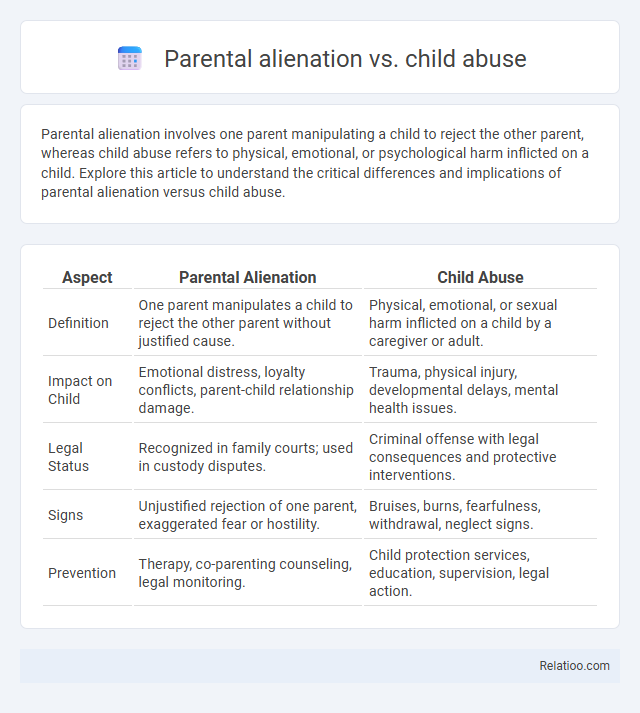Parental alienation involves one parent manipulating a child to reject the other parent, whereas child abuse refers to physical, emotional, or psychological harm inflicted on a child. Explore this article to understand the critical differences and implications of parental alienation versus child abuse.
Table of Comparison
| Aspect | Parental Alienation | Child Abuse |
|---|---|---|
| Definition | One parent manipulates a child to reject the other parent without justified cause. | Physical, emotional, or sexual harm inflicted on a child by a caregiver or adult. |
| Impact on Child | Emotional distress, loyalty conflicts, parent-child relationship damage. | Trauma, physical injury, developmental delays, mental health issues. |
| Legal Status | Recognized in family courts; used in custody disputes. | Criminal offense with legal consequences and protective interventions. |
| Signs | Unjustified rejection of one parent, exaggerated fear or hostility. | Bruises, burns, fearfulness, withdrawal, neglect signs. |
| Prevention | Therapy, co-parenting counseling, legal monitoring. | Child protection services, education, supervision, legal action. |
Understanding Parental Alienation: Definition and Key Features
Parental alienation refers to a psychological manipulation where one parent deliberately undermines the child's relationship with the other parent, often resulting in unjustified rejection or hostility. It differs from child abuse, which involves direct physical, emotional, or sexual harm inflicted on the child, whereas parental alienation primarily affects the child's perception and emotional bond with a parent. Key features of parental alienation include persistent negative messaging, withholding communication, and fostering fear or disrespect toward the targeted parent without legitimate cause.
Child Abuse: Types, Signs, and Long-Term Effects
Child abuse encompasses physical, emotional, sexual abuse, and neglect, each causing significant trauma that can impair a child's development and well-being. Signs of abuse include unexplained injuries, withdrawal, anxiety, and behavioral changes, making early detection critical for intervention. Your awareness of these indicators helps protect children from long-term effects like PTSD, depression, and impaired social relationships, highlighting the need for prompt support and healing.
Parental Alienation vs. Child Abuse: Core Differences
Parental alienation involves one parent manipulating a child to reject the other parent, whereas child abuse encompasses physical, emotional, or sexual harm inflicted directly on the child. The core difference lies in parental alienation targeting the child's perceptions and relationships, while child abuse targets the child's well-being and safety. Your understanding of these distinctions is crucial for identifying and addressing the appropriate interventions.
Overlapping Dynamics: When Alienation Becomes Abuse
Parental alienation can escalate into child abuse when persistent manipulation leads to emotional harm, undermining Your child's psychological well-being. Both parental alienation and child abuse involve harmful patterns that disrupt the parent-child relationship, but alienation specifically targets loyalty and affection through coercive control. Recognizing the overlapping dynamics is crucial for legal and mental health professionals to protect the child's best interests and intervene effectively.
Psychological Impact on Children: Alienation and Abuse Compared
Parental alienation and child abuse both severely impact children's mental health but differ in psychological consequences; parental alienation erodes a child's emotional bonds with one parent, often leading to confusion, anxiety, and loyalty conflicts, while child abuse causes direct trauma, fear, and long-term emotional scars such as depression and PTSD. Studies show children experiencing parental alienation frequently struggle with identity and trust issues, whereas abused children have higher risks for behavioral problems and impaired social development. Understanding these distinctions helps in tailoring therapeutic interventions to address alienation's relational damage versus abuse's trauma-induced symptoms.
Legal Perspectives: Navigating Allegations in Family Courts
Legal perspectives on parental alienation versus child abuse emphasize distinct evidentiary standards, with family courts rigorously evaluating psychological evaluations, documented interactions, and credible witness testimony to determine the child's best interest. Parental alienation claims require proven manipulation undermining the child's relationship with one parent, while child abuse allegations necessitate clear evidence of harm or risk to the child's well-being. Courts prioritize child protection statutes and often involve child psychologists to navigate complex dynamics, aiming to balance safeguarding with preventing false accusations.
Assessment and Identification: Tools for Professionals
Assessment and identification of parental alienation and child abuse require specialized tools to distinguish the emotional manipulation from physical or psychological harm. Professionals utilize validated instruments like the Parental Alienation Syndrome Scale (PASS) alongside child welfare assessments and trauma screening tools to evaluate the child's experiences accurately. Ensuring Your child's well-being involves careful, multidisciplinary analysis to differentiate complex dynamics and implement appropriate interventions.
Consequences for Parents: Accusations and Legal Ramifications
Accusations of parental alienation can lead to complex legal battles, often resulting in loss of custody or visitation rights for the accused parent. Unlike traditional child abuse, which involves direct harm to the child, parental alienation centers on psychological manipulation, but both have severe consequences in family court. Courts increasingly recognize parental alienation as a form of emotional abuse, imposing legal ramifications such as supervised visitation or mandatory counseling to protect the child's well-being.
Strategies for Prevention and Intervention
Effective strategies for preventing and intervening in parental alienation, child abuse, and parental alienation involve early identification through comprehensive assessments by mental health and child welfare professionals. Implementing family therapy, parenting education programs, and court-monitored visitation plans can help rebuild trust and communication between parents and children while ensuring child safety. Legal frameworks and multidisciplinary collaboration are essential to protect children's well-being and address both emotional manipulation and physical maltreatment.
Supporting Children Through Recovery and Healing
Supporting children through recovery and healing from parental alienation involves specialized therapeutic interventions that address emotional trauma and rebuild healthy family relationships. Unlike child abuse, which often requires immediate protection and legal intervention, parental alienation demands ongoing counseling to restore trust and communication between the child and the alienated parent. Your active involvement in providing a stable, loving environment greatly enhances the child's resilience and fosters long-term emotional well-being.

Infographic: Parental alienation vs Child abuse
 relatioo.com
relatioo.com